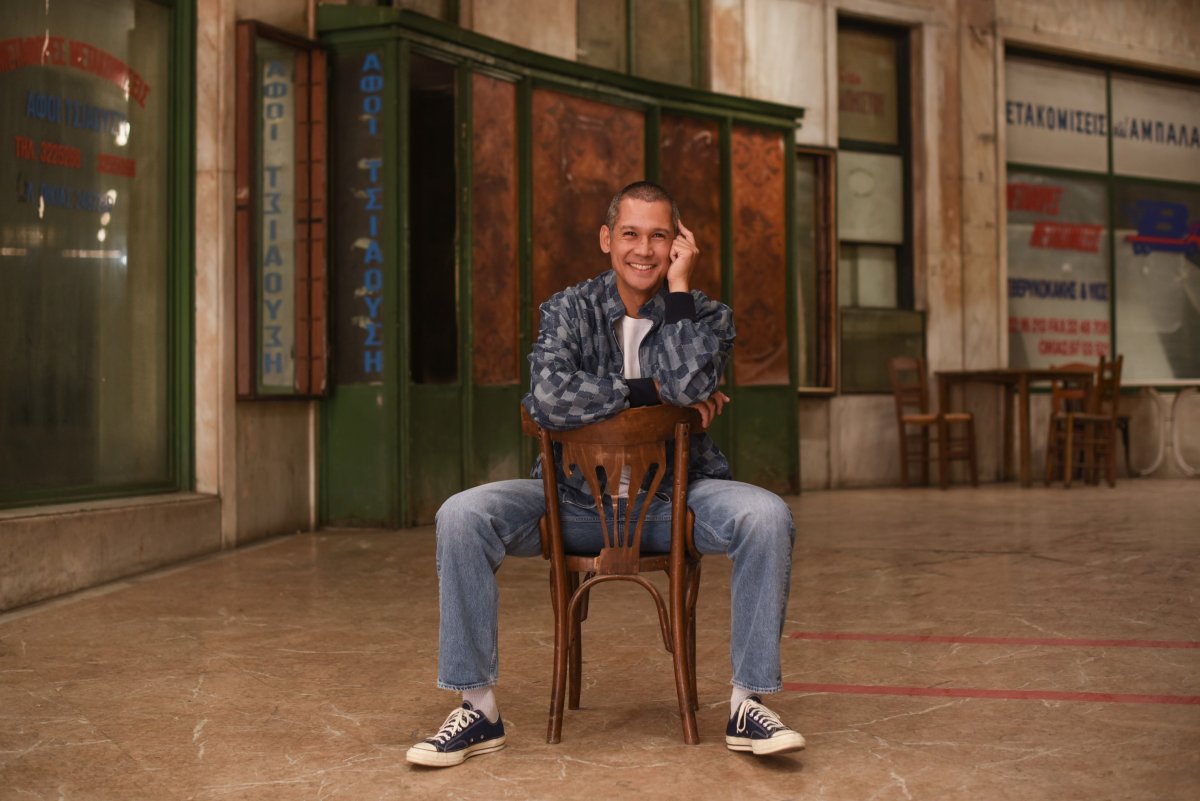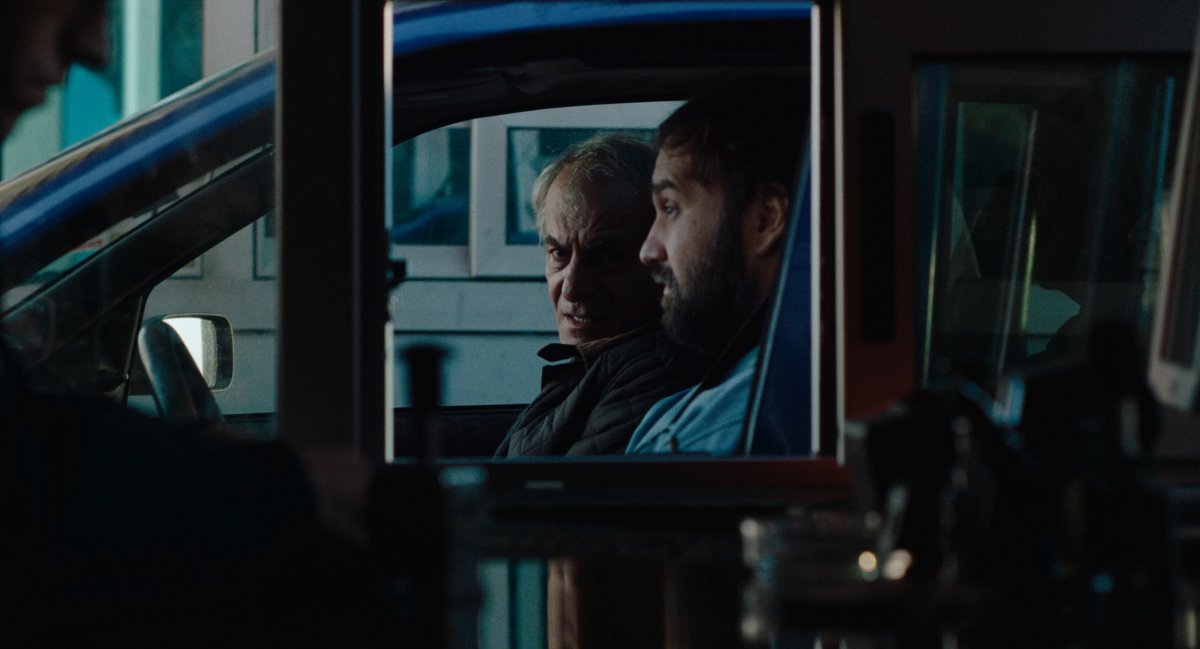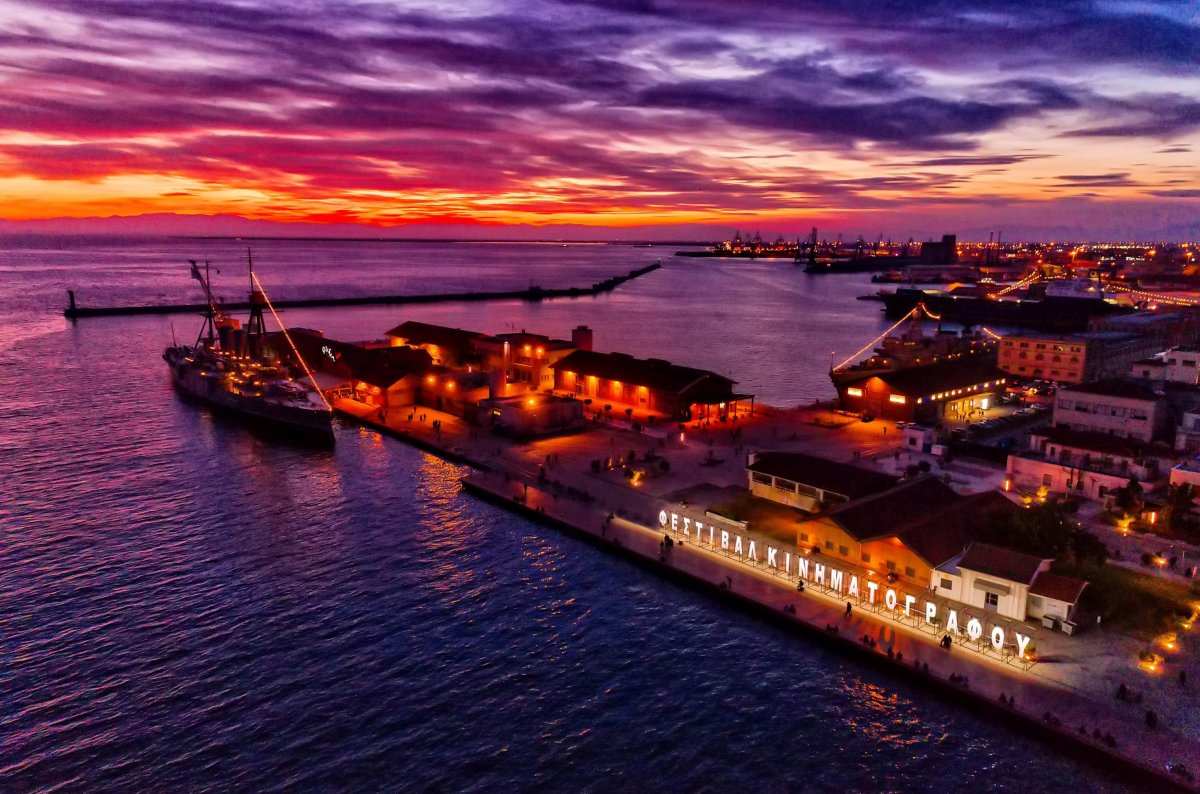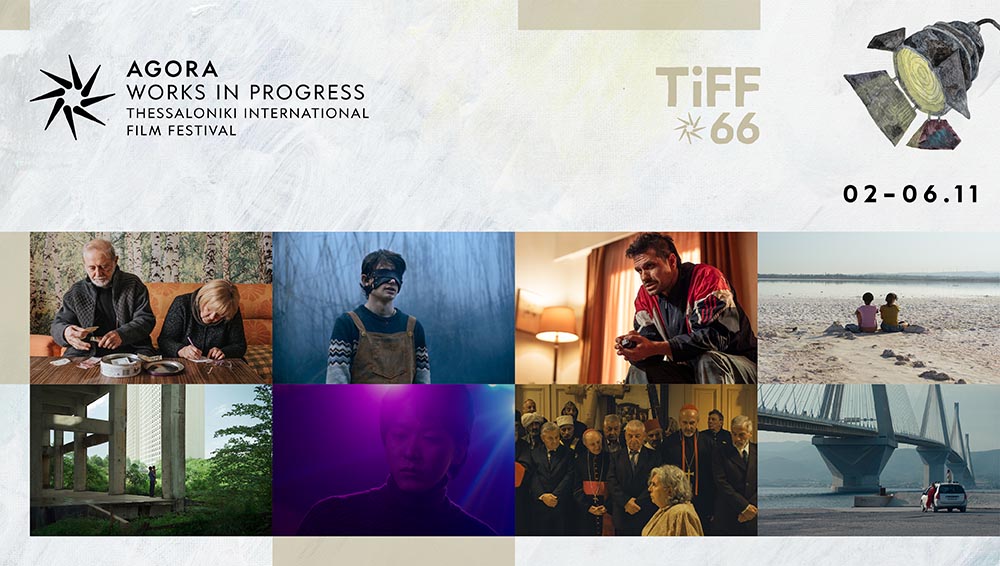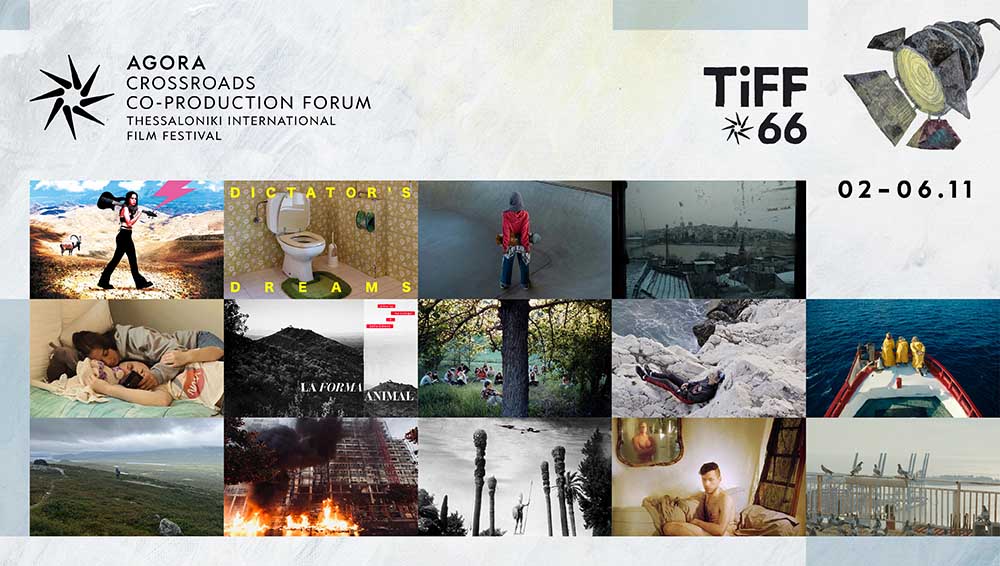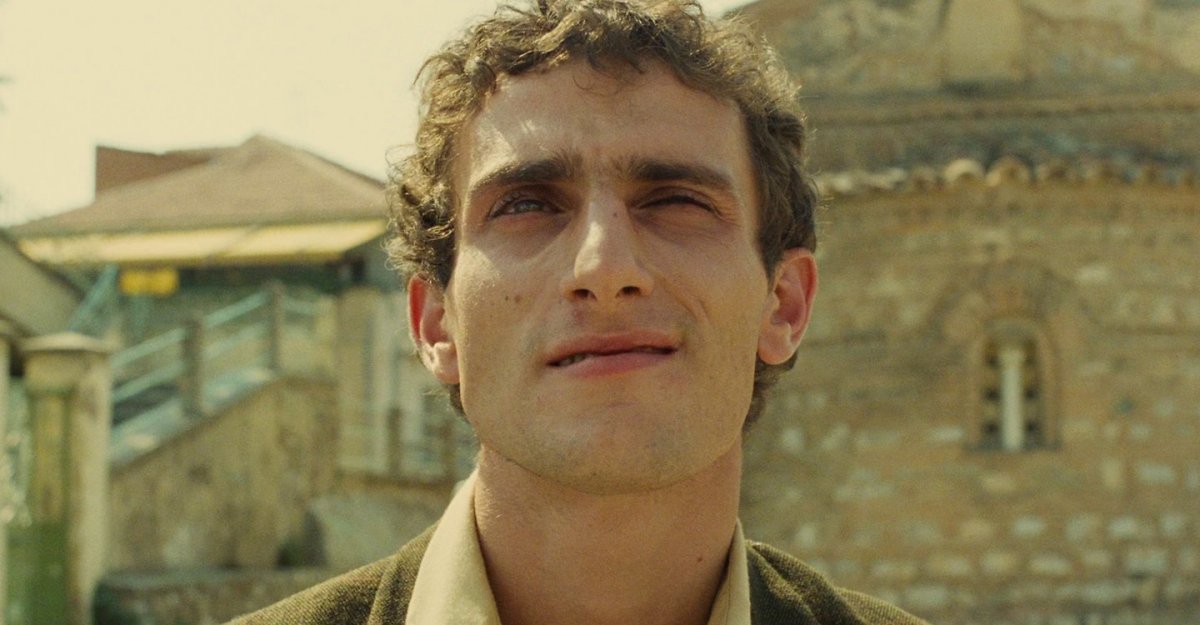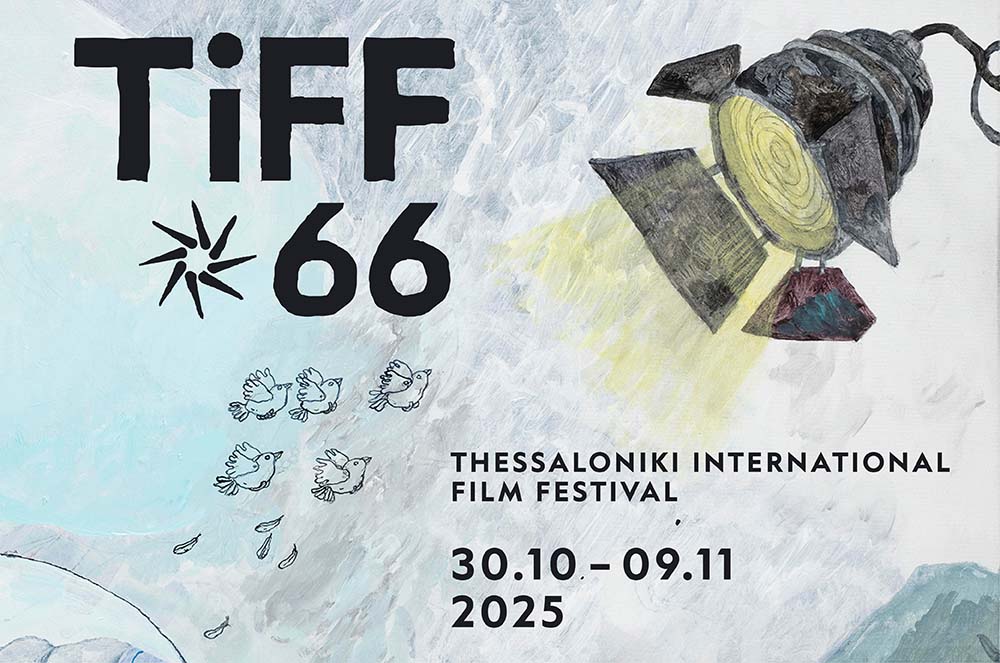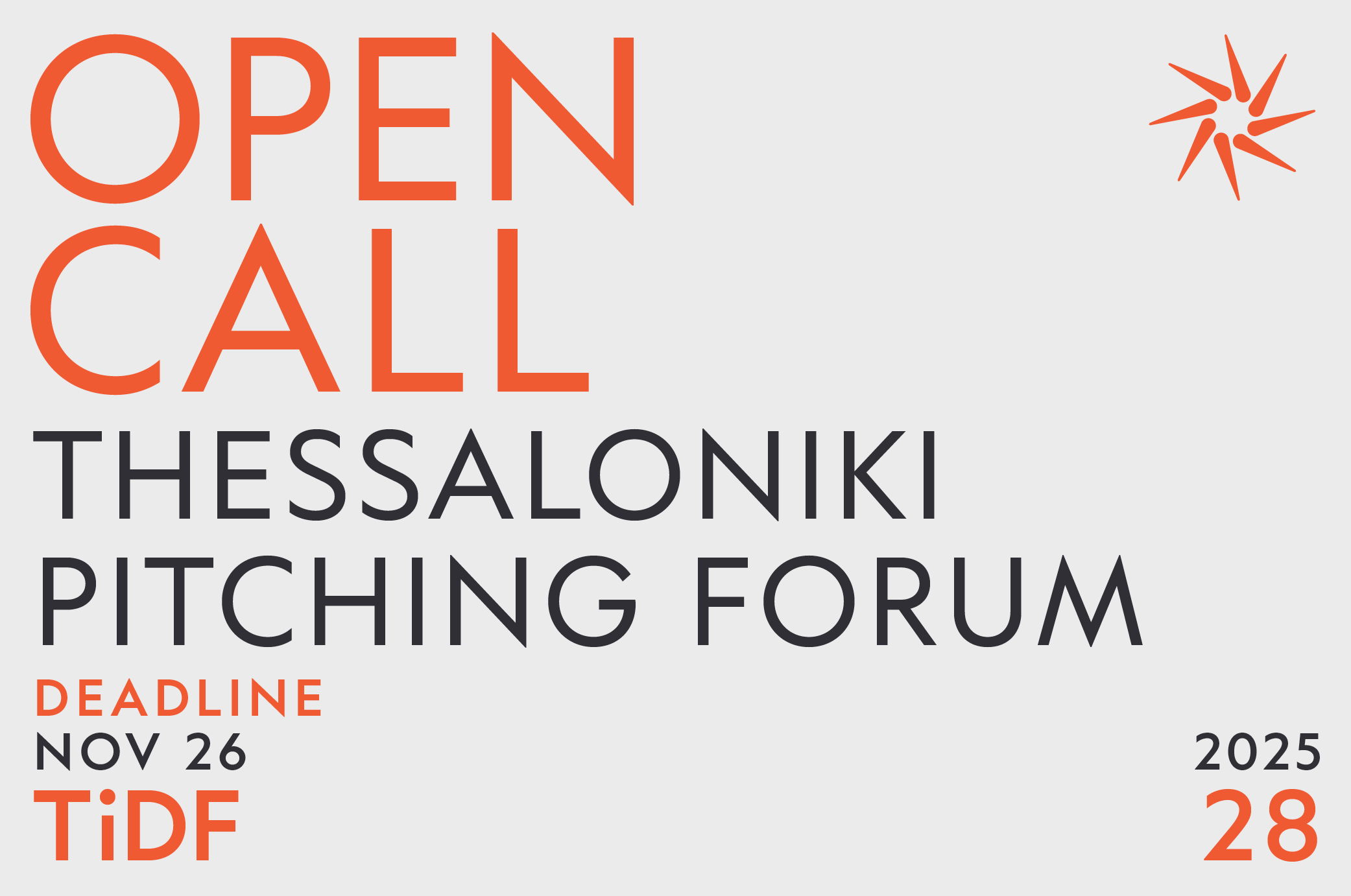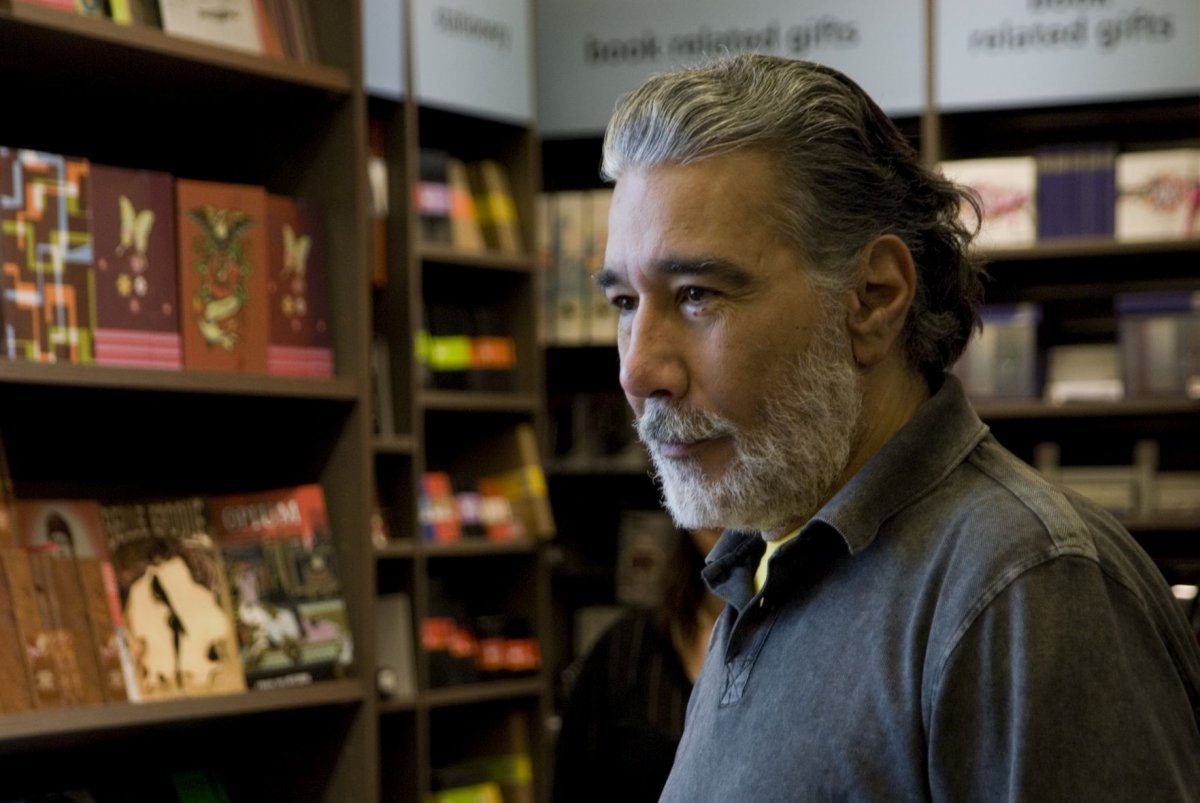Amidst an emotional ambiance, the awards’ ceremony of the 24th Thessaloniki Documentary Festival took place on Sunday, March 20th, 2002, at Olympion. The ceremony was prefaced by the Festival’s General Director, Elise Jalladeau, and Artistic Director, Orestis Andreadakis, who greeted the audience. “Another Thessaloniki Documentary Festival came to an end. The twenty-fourth. And now, it is time for the juries and the audience to tell us what they have decided about the awards. However, before we move on to the awards, allow us to thank our co-workers, our supporters, our sponsors”, Elise Jalladeau initially stated. “The Municipality of Thessaloniki, the Region of Central Macedonia, the sector of Macedonia-Thrace of the Ministry of Interior, and of course, the Ministry for Culture and Sports that is always with us”, Orestis Andreadakis added. “I wish you to be well. Stay safe for the next Film Festival, in November, but also for the Evia Film Project, in June, in north Evia”, Elise Jalladeau added. At this point, Mr. Andreadakis welcomed the host of the evening, the film critic and a friend of the Festival, Theodore Koutsogiannopoulos.
“Welcome! I am thrilled to be here. Please know that tonight’s ceremony is broadcasted live by the Public Television of Thessaloniki TV 100. And let’s move on to the awards. Of course, already, a few days ago Agora, the Festival’s development branch, presented its awards. This year, 450 films participated in the Agora Doc Market, 10 projects in Docs in Progress and 13 projects in Thessaloniki Pitching Forum, while Agora hosted 300 guests from around the world. There were 8 Agora Talks, 5 projects in Agora Lab, 35 women took part in the European Women’s Association’s EWA Mentoring Session, while more than 450 meetings took place and 12 awards amounting to more than 35,000 euros were awarded. The awards are both cash prizes and offered services. Congratulations to the winners and anyone who took part. We cannot wait to see the projects in their final film form, at the Festival. We begin with the independent juries’ awards”, Theodore Koutsogiannopoulos said.
The award by the Greek department of WIFT GR (Women In Film & Television), was awarded to a director of a film that is part of the Official Program of the Thessaloniki Documentary Festival. Members of this jury were the filmmaker and film theorist Rea Walldén, creative producer Effie Skrobola and the writer and screenwriter Manina Zoumboulaki. Ms. Sofia Kaitatzi-Whitlock, Professor at the School of Journalism and Mass Media of AUTH, took the stage to present the award of WIFT’s Greek section, to director Uli Decker for the documentary ANIMA – My Father’s Dresses. “An award for a film that surpasses the gendered conventions and stereotypes, and turns a traumatic secret to resistance and liberation”, Ms Witlock stated.
The ceremony went on with the International Amnesty award for the best focusing on human rights issues. The members of the Jury were: Alexia Tsouni (Vice-president of International Amnesty’s Greek section), Marianna Leontaridou (member of International Amnesty), Yannis Angelakis (producer), Nikos Ziogas (director and filmmaker) and Maria Stefanidou (actor and kinesiologist). Alexia Tsouni went on stage and thanked the contributors for the excellent cooperation, as well as the Festival, which promotes the character of Thessaloniki to the whole world. Afterwards, she awarded the documentary that starts with Jim Morrison’s words “whoever controls the media, controls the mind”, F@ck This Job by Vera Krichevskaya. The Russian director went on stage, thanked the Festival and noted: “I am proud of my characters and my protagonist, the whole work is by them. most of them have left Russia with no official documents or money. It is our duty now to rebuild Doszhd TV and to tell the truth about this war”.
The WWF Hellas award was presented for the best film of environmental interest. The Jury’s members were Iasonas Kantas (Head of Communications and Citizen Engagement), Kostas Gakis (director) and Alexandros Romanos Lizardos (film critic and director). Giorgos Vlachos, member of the WWF Hellas Directors Board, went on stage to present the awards. “Two years ago, our planet came to face Covid, a month ago, it was war and absurdity. WWF’s message is: “fight for the world”, we believe that what’s fair will prevail”, George Vlachos stated. The jury awarded a Special Mention to the film Nuisance Bear by Jack Weisman & Gabriela Osio Vanden. The ceremony continued with the WWF Hellas award for the best environmental-themed film, a film shot in the mountains of Thibet, with people carrying huge torched in order to trace the only existing snow leopard. The Velvet Queen by Marie Amiguet & Vincent Munier won the award.
The audience’s preferences followed next, as expressed by the FISCHER Audience Awards, which amounted to five: for a Greek and an international film under 50 minutes, for a Greek and an international film over 50 minutes and the Platform / From screen to Screen award. Lazaros Vogiatzoglou, head of sponsorships and events of Athenian Brewery Northern Greece, came on stage to present the audience awards. “Good evening. We are particularly happy that the Thessaloniki Documentary Festival returns home and we can enjoy cinema. The documentaries shed light on truths, are powerful and innovative and remind us that art always imitates life. This year, Fischer beer, true to its tradition, is here to honor the films people loved. We thank the festival and its partners for organizing this edition”, Lazaros Vogiatzoglou said.
Initially, the FISCHER Audience Award for a Greek film under 50’ was awarded to IODINE - Greece on the Ruins of Missolonghi by Orfeas Peretzis, who came on stage to receive the award. “Thank you to the audience who came to see our film last night, a few floors higher from here, this is a very special award under the circumstances. My appreciation of the artists who inspire us in the most unexpected ways is so deep, and so is my appreciation of our co-producers who are here, Konstantinos Vasilaros, Niki Theodoridi, Bauhaus studio. Let me make a wish: more art, more poetry, less war.” The FISCHER Audience Award for an international film under 50’, was received by Take Me Where There Is Life: A Letter to My Father by Carmen La Griega.
Then, the FISCHER Audience Award for a Greek film over 50’ was bestowed to the film Broken Sound by Fivos Kontogiannis, who came on stage to receive the award. “I want to thank the Festival for screening the film and the audience who loved it. I dedicate this award to all bouzouki players, the protagonists and the new generation of musicians”, he said in relation. The FISCHER Audience Award “Peter Wintonick” for an international film over 50’, was bestowed to Eternal Spring by Jason Loftus.
The awards for the audience preferences came to an end with the FISCHER Audience Award Platform / From screen to Screen for a Greek film that was screened online and premiered at the 24th TDF. The award was bestowed to +1 by Argyris Liapis, who came on stage to receive it. “Good evening, everybody, I am Argyris Liapis and this is Maria Theodosiou, one of the three protagonists of our documentary. We are very happy, and when someone is very happy, they spontaneously want to thank everybody, the universe, God, in whatever form one believes in, the Festival for screening our film, an amateur production, and all the people who helped. The audience that got our message and responded. I am thrilled to receive this award, not as an architect of the endeavor, but as a mere messenger of the message by three protagonists, Anna-Maria, Orestis and Maria, send out.” Maria, who joined Argyris Liapis on stage, thanked the audience for their love.
Soon after, the Youth Jury awards were presented, by students of various departments of the Aristotle University of Thessaloniki, honoring Greek films that participated in the International Program sections. In this year’s Festival, the jury constituted of five students from the University of Thessaloniki, under the supervision of professor Betty Kaklamanidou, Assistant Professor of and Film History and Theory. The members of this year’s five-member committee are: Alexandra Apostolidou, Avraam Athanasiadis, Olga Melissanidou, Dimitris Tsintsilidas, Ekaterini Vergou.
Katerina Vergou went on stage to present the awards. “Thank you to Ms. Betty Kaklamanidou who trusted us and gave us the chance to be little critics, thank you to the rest of the jury and to the Festival”, she mentioned. “the Special Jury Prize goes to a film that stands out for the courage of the filmmaker, as well as for the blunt depiction of a timely and longstanding reality, that we tend to exclude from the public discourse. The award was bestowed to the film The Other Half by Giorgos Moutafis, who is now on the frontline in Ukraine.
The award was received by his colleague, Jenny Tsiropoulou, who went on stage. “Good evening, thank you very much, we are truly honored by this award. Thank you to the Festival, the people who came to see the film in the theatres and those who watched it online, I am very sorry that Giorgos is not here to experience this moment with us, because the film is a labor of life for him, he had been working on it for 15 years. Giorgos has been in Ukraine for more than a month now, covering yet another war. He has, however, sent a message for us: “The memories from our childhood, the neighborhood and the Sunday trips to nature, the holidays, the school, our house and work. And then suddenly, war: Our problem is that we forget easily. Let this film be the start of a dialogue. Thank you for the honor and let’s make a promise so that we will never see another kid dead at sea”.
Moving on, Katerina Vergou presenter the Best Greek Film Youth Jury Award. “The award goes to a film that showcases, in an intelligent and cinematic way, and with a surprising sincerity, the problems and the concerns faced by the younger generation in Greece. For this reason, as well as for its realistic and insightful gaze, which triggered our empathy on many levels, we bestow the award to Arm Wrestler by Yorgos Goussis”. Yorgos Goussis went on stage to receive the award. “Thank you to the jury and the Festival for hosting us again, 4 months after the last time. Thank you to the production company, Vaso Patroumpa, Foteini Oikonomopoulou and Sofia Dimopoulou who supported the project so that a short film will turn into a feature film. Thank you of course, to my co-producers, the Greek Film Centre and ERT”.
The ceremony went on with the PEKK Award for a Greek film, which was presented by film critic Kostas Karderinis. Mr. Karderinis went on stage and thanked the Festival on behalf of PEKK, for the increasingly fruitful collaboration. “We present this award to a film that revives Kazantzakis’ writing, via the use of Giannis Angelakas’ voice, and the flexibility of the director, transporting Japanese culture to the capitalist version of our times”. The award was bestowed to the documentary Last Voyage by Aris Chatzistefanou. The director went on stage to receive the award. “Thank you to the jury and the Festival for such a cordial welcoming. We drew from a book, which follows a financial crisis, on the verge of a world war, while it also talks about a pandemic. We lived through the crisis, we lived through the pandemic, let’s hope this doesn’t come to a world war. Thank you to Aris Triantafillou, Thanos Tsantas, RSN for the music, Giannis Angelakas and Olia Lazaridou”.
The ceremony continued with the two FIPRESCI awards: one for the best International Competition documentary and one for the best Greek film of the Festival’s official program. This year, the jury was formed by Zane Balčus from Latvia, Héctor Llanos from Spain and Nikolas Aletras from Greece. Zane Balčus took the stage and awarded the FIPRESCI awards: “For the captivating observation of a young man’s struggle for balance in his professional and personal life, rural and urban environment, dreams and realities of everyday life. The inventive composition of shots and versatility of shooting locations allow for a unified look at a charismatic personality. Through this one man’s journey we are also allowed to have a glimpse into contemporary Greek society, making the film an important denominator of the country today The FIPRESCI Award for Best Greek Documentary goes to Arm Wrestler by Yorgos Goussis” The director went on stage for the awards, saying: “Thank you, I dedicate this award to my brother, who is the protagonist of the film, he deserves it”.
Moving on, Zane Balčus bestowed the Best Documentary Award of the International Competition. “For a delicate and sensitive look at vulnerable children who are facing the hardships of life already from a very young age. Even though set in a particular political context, the story has a universal meaning. The close observation of children’s personalities and relationships with their peers and grown-ups create an emotionally engaging and strong narrative, full of life and hope for a better future. The FIPRESCI Award for the film in the International Competition goes to A House Made of Splinters by Simon Lereng Wilmont”.
The television station of the Hellenic Parliament (Hellenic Parliament TV) presented its “Human Values” award to a Newcomers International Competition section film. The members of this year’s committee were: program consultant, producer and director, Aris Fatouros, head of the Hellenic Parliament TV’s Programming Department, Vassilis Douvlis, and program collaborator Kostas Dimos. The award was presented by Ms. Anna Efthimiou, Member of the Greek parliament from the First District of Thessaloniki, who went on stage. “Honorable contributors of the 24th Thessaloniki Documentary Festival, dear friends. As a Member of the Greek parliament from the First District of Thessaloniki, I congratulate the Festival and the contributors, because they are doing an excellent job. They are pillars for our city’s culture. Also, through this critical times we live in, such as the pandemic, the war in Ukraine which we all, and the financial crisis, they contribute even more to the support of the art and the artists, because this is how we communicate best with each other and are able to share our message. The award goes to a film, which skillfully binds together personal testimonies and 3D animation, to unfold a breathtaking story of a struggle for freedom of ideas and expression against an authoritarian regime that violently smothers any attempt of resistance”. The film Eternal Spring by Jason Loftus received the award.
ERT presented their first award, which is accompanied by the cash prize of 3,000 euros, to the Greek production that received the FIPRESCI Award. Filios Stangos, General Director of ERT3, went on stage to present the awards. “Good evening, as a representative for ERT and as a journalist, it would be a huge omission to not spare a moment to ponder on the hundreds of thousands of colleagues who can no longer work in Russia, and also to my colleagues who are in Ukraine at the moment. Four of them have already lost their lives, Brent Renaud was one of them, who went there to film a documentary. As to the awards, the first one is always the Greek film-recipient of the FISPRESCI Award. The Festival, ERT and FISPRESCI love Yorgos Goussis, multi-awarded at the last Film Festival in November. The ERT Award, accompanied by a cash prize of 3,000 euros, goes to the Greek documentary that won the 24th Thessaloniki Documentary Festival’s FISPRESCI award. It is Arm Wrestler by Yorgos Goussis”, Mr/ Stangos announced. Yorgos Goussis went on the stage to receive the award. Then, the second ERT award accompanied by a 2,000 euros’ cash prize, was bestowed to the project Sunken by Dimitris Gkotsis, selected from the Pitching Forum Jury.
The ceremony continued with the Greek Film Centre award for the official program. This year’s jury members are Ifigenia Vlachogianni (GFC Board of Directors member), Stavroula Geronimaki (Deputy Director of the GFC International Audiovisual Production section - Hellenic Film Commission), and Dimitris Bouras (Head of the GFC Press Office). The Greek Film Centre will bestow the award, accompanied by a 3,000-euro cash prize, to a debut director of a film over 50’ from the official Greek selection, that is premiering at the 24th Thessaloniki Documentary Festival. President of the GFC, Markos Holevas, went on stage to present the award. “The jury awards the film Itinerary by Orestis Athanasopoulos, for using the narrative format of the road movie as a connective chain between a series of small and fragmental stories in order to highlight the timely issue of Greeks’ immigration to Western Europe”. Orestis Athanasopoulos went on stage to receive the award. “Thank you, I did not expect that. I hope to keep it up the same way!”, he stated.
“The Mermaid Award, which was introduced for the first time in November 2018 at the Thessaloniki Film Festival, is the award for the best LGBTQI+-themed film from the Festival’s official selection. The prize is awarded by a three-member jury. The members of this year’s jury are: Hrönn Marinósdóttir from Iceland, founder and director of the Reykjavík International Film Festival, George Mitropoulos from Greece, cultural journalist, and Angel Cheng from Canada, Communications and Industry Engagement Director for NBO Film Festival in Kenya & producer”, Theodore Koutsogiannopoulos explained and invited Hrönn Marinósdóttir on stage to announce the winner.
“I would like to thank the Festival, on behalf of the jury. Before the main award, the jury would also like to acknowledge the remarkable and underrepresented perspectives of two particular films that challenge perceptions of gender and sexuality. We give Special Mentions to Mel by Inna Sahakyan and Paul Cohen and Sirens by Rita Baghdadi as uniquely illuminating stories of defiance and triumph to redefine our place in society”, Hrönn Marinósdóttir announced. Then she announced the 24TDF Mermaid Award. “A beautifully subtle expression of the need for acceptance of oneself as a whole human being, this film is a playful exploration of the struggles of growth, love and identity. The freedom in defying conventional binary norms is adeptly presented, and the importance of agency for self-determination is uniquely expressed in the form of a perfectly imperfect child and her family and friends. For its inspiringly joyful portrayal of gender fluidity and the powerful example it sets for families of non-cisgender children, we present the Mermaid Award of the 24th Thessaloniki Documentary Film Festival to Gabi, Between Ages 8 to 13 by Engeli Bromberg”.
The Podcast awards followed. “The Thessaloniki Documentary Festival presents for the second time a competition section, a tribute to the digital audio records that have conquered the world”, Theodore Koutsogiannopoulos announced. “Within this context, a three-member jury will bestow the cash prize of 2,000 euros to the best podcast of the 24th Edition. The jury consists of: director Eliana Abravanel, journalist and Kosmos radio station manager, Leonidas Antonopoulos, and journalist and radio producer, Matoula Kousteni”.
Taking the floor Ms. Abravanel stressed: “We are very, happy that the Festival gave us the chance to make nineteen audio trips. It was so hard to make a decision. These trips we would go on with Leonidas, who couldn’t be here today. The Special Mention goes to an exceptional piece of investigative journalism with elements of a political thriller, the podcast Invisibles by Marianna Kakaounaki. The ceremony went on with the Podcast Award. “The podcast we chose could have been an outstanding novella; it could have been a brilliant documentary film. It was in fact a post-mortem audio diary of a relationship, a profound farewell, an eloquent testimony of loss”, Ms. Koutseni said. The Podcast Award was received by Dimitris Daskas for Forever.
This year, the Thessaloniki Film Festival, in collaboration with the ENS Louis Lumière and the French Institute of Greece, offered the Award-Scholarship ENS Louis Lumière - French Institute for an Upcoming Audio Documentary Creator. The jury consisted of Frédérique Pressmann, documentary filmmaker & sound artist, and Théo Koutsaftis, audiovisual attaché at the French Institute of Greece. At this point, Mr. Koutsaftis took the floor to announce the award. “Thank you to the Festival for giving us the chance to listen to all these wonderful new podcasts from young creators. The Award-Scholarship ENS Louis Lumière - French Institute of Upcoming Audio Documentary Creator, goes to Nepheli Sani for the podcast Sonic Memorabilia. Nepheli Sani took the floor to receive her award. “Thank you for this opportunity, this podcast is the result of a collective process from a workshop that we organized in autumn”, she stated.
The ceremony continued with the International Competition sections awards, specifically with the >>Film Forward awards. This year’s jury members were the artist, anthropologist and Associate Professor at Tisch School of Arts, Toby Lee, director Babis Makridis and director and video artist Marta Popivoda. Toby Lee and Marta Popivoda took the stage, along with the Governor of the Region of Central Macedonia, Apostolos Tzitzikostas, who addressed a greeting.
“I would like to congratulate all those who participated in the Festival this year, because it is through their great work that the Festival’s important role as one of the main pillars of extroversion for Thessaloniki, is highlighted. This is something we try to achieve as a Region with the Film Office and already our work is fruitful. With our upgraded institutions, we are creating a world center for audiovisual productions, he stated. Then, Toby Lee announced the Special Award of the Jury, accompanied by a 3,000-euro cash prize. “It was such a pleasure working with my colleagues. We decided to bestow the award ex æquo to the documentaries Amateur by Martín Gutiérrez, and Letter to Nikola by Hara Kaminara.
Moving on, Maria Popivoda awarded the Golden Alexander form the >>Film Forward section, which is accompanied by a cash prize of 6,000 euros. “It’s wonderful to be back in Thessaloniki, especially since it’s for the Festival. The award goes to a film that, with minimal yet powerful and precise cinematic means, tells an important story of how patriarchal societies repress women”. The award was bestowed to The Bride by Samira Guadagnuolo & Tiziano Doria. Samira and Tiziano did not attend the ceremony, but they send a recorded video: “Good evening, it was such an honor for us to be awarded in Thessaloniki, it is a wonderful Festival. The news of the award surprised us, this is the first time we receive such an important recognition. We would like to thank the jury for their support and the courage they inspire in us to keep up our work with more determination”.
The ceremony went on with the Newcomers section of the Competition, for which 12 films over 50’ were nominated. The members of this year’s jury were Angeliki Aristomenopoulou, documentary filmmaker, Michael Graversen, renowned documentary director, and Laurien ten Houten, from the International Documentary Festival of Amsterdam. The jury went on stage and Theodore Koutsogiannopoulos invited the Mayor of Thessaloniki, Konstantinos Zervas, for the announcement.
“Good evening everybody. When we were here, in this room, ten days ago, I made a wish: at the closing, I would like for this horror, this tragedy, to be over. Unfortunately, that requires more pain, more blood, more destruction. This war brings us to deep contemplation. Thessaloniki made art, made cinema, filled the theaters and we are very happy about that. In any case, all this joy is experienced with an aching stomach, as we think of how close we are to the horror. I am, however, very happy to be presenting an award as the Mayor of Thessaloniki, to young creators, young talent, young filmmakers. I am even happier that this award carries the name of Dimitri Eipides, whose name is inextricably linked with the Documentary Festival. I am glad that young creators receive this award, carrying the name of such an important personality”, Mr. Zervas added.
Laurien ten Houten moved to announcing the Special Jury Prize, accompanied by a 4,000-euro cash prize. “The award goes to an important film with significant access to the world of the “devil’s drivers”. A film sheds light on matters of great urgency and gives a voice to an oppressed and marginalized group of people whose story had been left largely untold”. The award was bestowed to The Devil’s Drivers by Daniel Carsenty and Mohammed Abugeth. Mohammed Abugeth took the stage to receive the award. “This is my first work and my first award. It is a very important award and I am glad to be honored like this here in Greece, the country of philosophers. Thank you to my partner, who believed in me and worked with me for more than 10 years. I want to thank my family, all of you who worked at the Festival and Orestis Andreadakis, the Festival’s Artistic Director”, he said.
Afterwards, Aggeliki Aristomenopoulou awarded the Golden Alexander of the Newcomers “Dimitris Eipides” section, accompanies by a cash prize of 10,000 euros: “Good evening, it is a great honor to be presenting at the Festival an award dedicated to the memory of Dimitris Eipides. The award goes to a film that tells a beautiful and moving family story of belonging in a way which changes the narrative of migration. The film follows a loving father and his kids who travel back to Somaliland from Europe. Through coherent storytelling and beautiful cinematography, it shows –in a non-didactic manner– a family’s struggles and dreams. A family which tries to build a better future in, and for their ancestral land”. The award was bestowed to the documentary Golden Land by Inka Achté. Inka Achté was not present at the ceremony, but she sent a recording video along with the wonderful heroes of her film. “Thank you for this incredible honor. Unfortunately, I had to be back in Finland. It is somewhat unfair to be receiving this award myself, since the film is a collaborative work of many people. This is why it worked so well, we had a smooth cooperation. Thank you for the bottom of my heart. It is important that a story about racism resonated with the jury. I hope we can become more open and inclusive as people and as film community”.
Then, the International Competition awards were presented. The jury members were the documentary directors, Alexandre O. Philippe, Dimitris Koutsiabasakos and Laila Pakalnina. Dimitris Koutsiabasakos and Alexandre O. Philippe went on stage, along with the Deputy Minister of Culture and Sports, Responsible for Modern Culture Issues, Nikolas Giatromanolakis who performed the announcement.
“Good evening, as we all know the audience’s interest in documentary is becoming all the more intense and increasing, and that is no coincidence. Documentaries, apart from their artistic value, apart from their cinematic value, enlighten more or less, aspects of our world, and approach current events more and more directly. So, at this year’s festival, we watched films about issues that stand at the epicenter of the international discourse, such as the refugee crisis, the femicides, the climate crisis and of course the war and the invasion of Russia in Ukraine. We watched documentaries that depict different sides of war, an obvious or an underground one, with many different types of victims. It is however clear, that democracy cannot exist without freedom of press, expression, speech and self-determination: without independence.
This war aims to afflict the freedom as much of the Ukrainian people, who fight for their independence, as of all the Russians who have been dragged into a war they do not support”, Mr. Giatromanolakis noted and thanked Vera Krichevskaya for her film, saying that it is an honor for him to meet people who fight with all they have against established power. “You have become the unexpected heroes of a story about a war that goes years back and manifests in this way. I hope you’ll be able to rebuild your station in Moscow. Now, as Ministry of Culture, we support the Documentary Festival in its endeavor, not only for its artistic dimension, but also for the evident and loud impact on public opinion, helping us be better and more informed as citizens. I am very proud to be collaborating with the Festival, and this is something we will continue to do. In this spirit, we have included works for the Thessaloniki Film Festival from the Recovery Fund, of the scale of 2.1 million euros”, he concluded.
At this point, Alexander O. Philippe presented the Special Jury Award, accompanied by a cash prize of 5,000 euros. “Good evening, thank you for this opportunity, it is wonderful to be back to the Festival. Thank you for your trust. It is my honor to work with Dimitris and Laila. “There are two films that stood out for us. Two profoundly moving and intricate films that, in many ways, struck us as companion pieces, and that deserve to be seen together”. The Special Jury Award goes to a film that can only give us hope in future generations and their capacity to make the world a better place. The award went to Young Plato by Declan McGrath & Neasa Ní Chianáin.
Immediately after, Dimitris Koutsiabasakos presented the Golden Alexander award of the International Competition, accompanied by a cash prize of 12,000 euros. “Firstly, I would like to thank the Festival for the honor of being a part of this jury but also for the incredible movies I had the chance to watch. The Golden Alexander Award goes to an unforgettable film that shines a light on the burden carried by children for the horrors and mistakes perpetrated by the world of the adults who should be caring for them. The Golden Alexander Award goes to A House Made of Splinters by Simon Lereng Wilmont”. The director, who had won the Golden Alexander also in 2018 with his film The Distant Barking of Dogs, did not attend the ceremony but sent a video: “Good evening Thessaloniki, thank you for this great news. I am very happy that my film won the Golden Alexander, I almost cannot believe it. For me, it is like a light went on amidst the darkness we live in. I cannot wait to share the news with my personal heroes, Sasha, Ivan, Kolia, Margarita, and Olga. It is really important to also send a big thank you to the team behind the film, Asat, Alina, Dalia, Mikha, who are still in Ukraine. This film would not have been made if it weren’t for them and I hope that Russia stops this brutal and meaningless war soon, so that I can go back and celebrate with them in the right way. I also want to thank the Festival team for taking such good care of me and my daughter while we were there. You made us feel like family, and for that, I thank you”.
After the awards, followed the screening of the film Blind Ambition by Warwick Ross and Rob Coe.
A brief summary of the film:
Joseph, Tinashe, Marlvin and Pardon are part of a wave of Zimbabweans who left their economically-hit homeland for a better life elsewhere. After their perilous journeys they arrive in South Africa, eventually get jobs in restaurants, gain interest in the intricacies of wine, become sommeliers, meet and bond with one another, and are encouraged to form the first-ever Zimbabwe team to compete in The World Wine Blind Tasting Championships – the Olympics of the wine world. This documentary follows their ambitious path to their unlikely spot in this annual competition held in France and primarily made up of western European teams, where they must sample twelve different wines and guess the country, winery, and vintage – a challenge for any oenologist. An Olympian story that Bacchus would approve, Blind Ambition is an inspiring, robust look at four committed men facing tough competition with an undaunting vision and mission that goes beyond winning medals.




